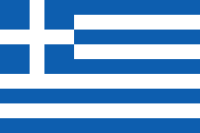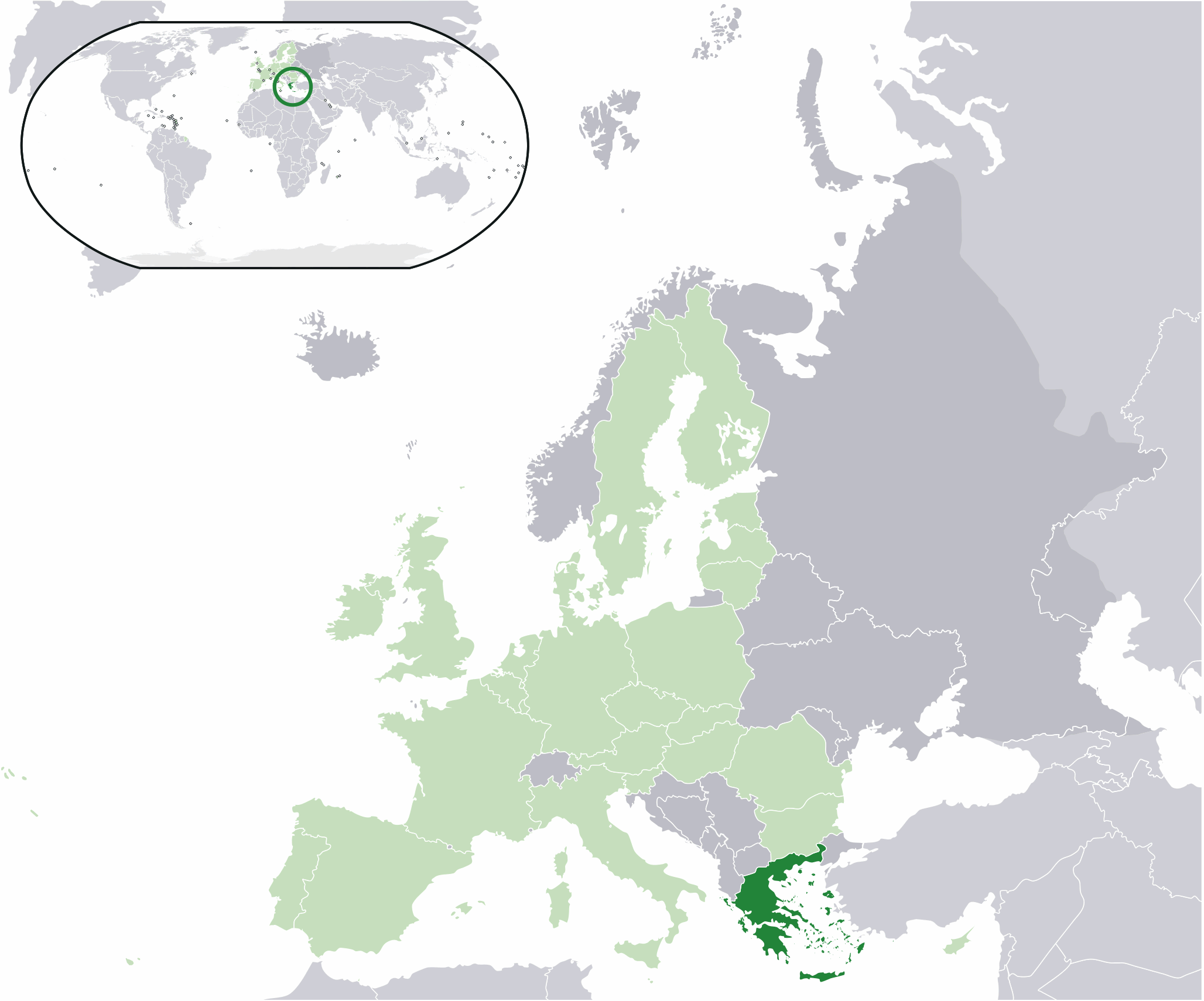 Greece (English: /ˈɡriːs/; Greek: Ελλάδα, Elláda, IPA: /eˈlaða/; Ancient Greek: Ἑλλάς, Hellás,IPA: /helːás/), also known as Hellas and officially the Hellenic Republic (Ελληνική Δημοκρατία, Ellīnikī́ Dīmokratía, IPA: /eliniˈci ðimokraˈtia/), is a country in southeastern Europe, situated on the southern end of theBalkan Peninsula. The country has land borders with Albania, the Republic of Macedonia and Bulgaria to the north, and Turkey to the east. The Aegean Sea lies to the east of mainland Greece, the Ionian Sea to the west, and the Mediterranean Sea to the south. Greece has the tenth longest coastline in the world at 14,880 km (9,246 mi) in length, featuring a vast number of islands (approximately 1400, of which 227 are inhabited), including Crete, the Dodecanese, the Cyclades, and the Ionian Islands among others. Eighty percent of Greece consists of mountains, of which Mount Olympus is the highest at 2,917 m (9,570 ft).
Greece (English: /ˈɡriːs/; Greek: Ελλάδα, Elláda, IPA: /eˈlaða/; Ancient Greek: Ἑλλάς, Hellás,IPA: /helːás/), also known as Hellas and officially the Hellenic Republic (Ελληνική Δημοκρατία, Ellīnikī́ Dīmokratía, IPA: /eliniˈci ðimokraˈtia/), is a country in southeastern Europe, situated on the southern end of theBalkan Peninsula. The country has land borders with Albania, the Republic of Macedonia and Bulgaria to the north, and Turkey to the east. The Aegean Sea lies to the east of mainland Greece, the Ionian Sea to the west, and the Mediterranean Sea to the south. Greece has the tenth longest coastline in the world at 14,880 km (9,246 mi) in length, featuring a vast number of islands (approximately 1400, of which 227 are inhabited), including Crete, the Dodecanese, the Cyclades, and the Ionian Islands among others. Eighty percent of Greece consists of mountains, of which Mount Olympus is the highest at 2,917 m (9,570 ft).
Modern Greece traces its roots to the civilization of ancient Greece, generally considered the cradle of Western civilization. As such, it is the birthplace of democracy, Western philosophy, the Olympic Games, Western literature and historiography, political science, major scientific and mathematical principles, and Western drama, including both tragedy and comedy. This legacy is partly reflected in the 17 UNESCO World Heritage Sites located in Greece. The modern Greek state was established in 1830, following a victorious uprising against Ottoman rule.
A developed country with a very high Human Development Index and standard of living, Greece has been a member of what is now the European Union since 1981 and its Economic and Monetary Union since 2001, NATO since 1952, and the European Space Agency since 2005. It is also a founding member of the United Nations, the OECD, and the Black Sea Economic Cooperation Organization. Athens is the capitaland the largest city in the country; other major cities include Thessaloniki, Patras, Heraklion, Larissa and Volos.
The culture of Greece has evolved over thousands of years, with its beginnings in the Mycenaean and Minoan Civilizations, continuing most notably into Classical Greece, the Hellenistic Period, through the influence of theRoman Empire and its Greek Eastern successor the Byzantine Empire. The Ottoman Empire too had a significant influence on Greek culture, but the Greek War of Independence is credited with revitalizing Greece and giving birth to a single entity of its multi-faceted culture throughout the ages.
Most western philosophical traditions began in ancient Greece in the 6th century BC.The first philosophers are called “Presocratics” which designates that they came before Socrates. The Presocratics were from the western or the eastern colonies of Greece and only fragments of the original writings of the presocratics survive, in some cases merely a single sentence.
Historically agricultural, Greece has seen industry replace agriculture as the leading source of income; agriculture accounts for about 5% of the gross domestic product, while industry accounts for some 20%. Tourism, a part of the growing service sector, provides a vital source of revenue. The chief agricultural products are wheat, corn, barley, sugar beets, olives and olive oil, tomatoes, wine, tobacco, and potatoes. Large numbers of sheep and goats are raised.
Notes from Wikipedia and Answers.com









